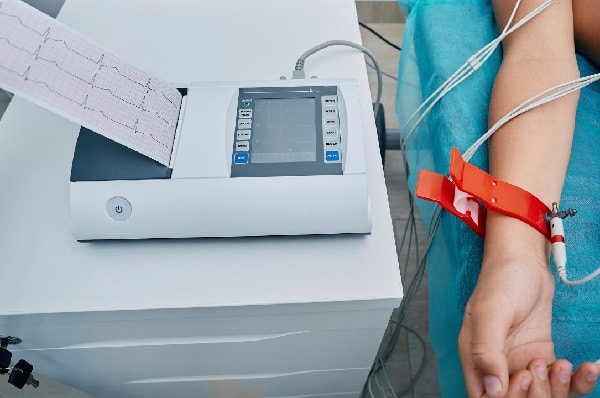Chest pain, a symptom that often evokes a palpable sense of alarm, is a complex medical presentation with a myriad of potential causes. While the immediate association for many is a heart-related issue, the reality is that chest pain can stem from a variety of sources, both cardiac and non-cardiac. It’s paramount to understand the diverse origins of this discomfort, as the implications and treatments can vary significantly. By delving into the various causes, from the commonly known to the lesser recognized, individuals can approach such symptoms with a more informed perspective.
Contents
Heart-Related Causes

Being a vital organ, the heart is often the first concern when one experiences chest pain. A heart attack, medically known as a myocardial infarction, is caused by a blockage in the coronary arteries, leading to reduced blood flow to the heart muscle. Symptoms can include intense chest pain, shortness of breath, and pain radiating to the arms or jaw. It’s imperative to seek medical attention immediately if a heart attack is suspected.
Angina, on the other hand, is a type of chest pain caused by reduced blood flow to the heart but is not as severe as a heart attack. It can be a warning sign of underlying heart disease. Pericarditis, another heart-related cause, is the inflammation of the pericardium, the thin sac-like membrane surrounding the heart. This condition can cause sharp, stabbing chest pain that may worsen when lying down.
Digestive Causes

Chest pain isn’t always a result of heart issues; sometimes, our digestive system is the culprit. Heartburn, a common digestive cause, results from stomach acid refluxing into the esophagus. This acid can irritate the esophageal lining, leading to a burning sensation in the chest, often mistaken for heart pain. It’s typically accompanied by a sour taste in the mouth and can be triggered by certain foods, alcohol, or lying down after a meal.
Other digestive sources of chest pain include issues with the gallbladder or pancreas. Gallstones or inflammation of these organs can lead to abdominal pain that radiates to the chest. Similarly, swallowing disorders, often linked to conditions of the esophagus, can cause pain during the act of swallowing, further mimicking heart-related pain.
Muscle And Bone Causes

Digging even further, not all chest pain originates from internal organs. Sometimes, the musculoskeletal system is responsible. Costochondritis, an inflammation of the cartilage that connects a rib to the breastbone, can cause chest pain that feels similar to a heart attack. This pain often worsens with movement or deep breathing.
Sore muscles, resulting from strenuous activities or chronic pain conditions, can also manifest as chest discomfort. Additionally, injuries to the ribs, whether from a fall or direct blow, can lead to sharp, localized pain. It’s essential to differentiate between musculoskeletal and heart-related pain, as treatments and implications vary significantly.
Lung-Related Causes

The lungs, situated in the chest cavity, may also be sources of chest pain when afflicted by certain conditions. A pulmonary embolism, a sudden blockage in one of the pulmonary arteries in the lungs, is often caused by blood clots. This condition can lead to chest pain and shortness of breath, requiring immediate medical attention.
Pleurisy, another lung-related cause, is the inflammation of the pleura, the two thin layers of tissue that separate the lungs from the chest wall. When these layers become inflamed, they can rub against each other, causing sharp chest pain that intensifies with breathing. A collapsed lung, or pneumothorax, occurs when air leaks into the space between the lung and chest wall, leading to chest pain and difficulty breathing.
Psychological Causes

While the physical causes of chest pain are often the primary focus, it’s essential not to overlook the role of psychological factors. Panic attacks, for instance, can produce symptoms that closely mimic those of a heart attack. Intense fear, palpitations, shortness of breath, and chest pain are common during these episodes. Understanding the psychological roots of such symptoms can help in managing and treating them more effectively.
Anxiety, a pervasive mental health condition, can also manifest as chest discomfort. Chronic stress or acute anxiety episodes can lead to muscle tension, palpitations, and chest tightness. Recognizing the link between mental well-being and physical symptoms can guide individuals toward holistic treatments, encompassing both mental and physical health.
Other Causes

Beyond the commonly discussed reasons, there are other potential sources of chest pain. Shingles, caused by the same virus responsible for chickenpox, can affect the nerves around the ribs. Before the characteristic rash appears, one might experience pain, tingling, or burning in the chest area, often mistaken for other conditions.
Infections or tumors in the chest can also lead to pain. While these causes are rarer, infections like pneumonia or inflammation of the heart (myocarditis) can result in chest discomfort. Tumors, whether benign or malignant, can exert pressure on surrounding structures, leading to pain and other symptoms.
Risk Factors

Certain factors can increase the likelihood of experiencing chest pain. Age plays a significant role; older individuals are more prone to heart-related issues, making chest pain a more concerning symptom in this demographic. Tobacco use, with its myriad of harmful effects, is a leading risk factor for heart disease and can exacerbate conditions leading to chest pain.
High blood pressure, or hypertension, is another significant risk factor. Over time, elevated blood pressure can lead to coronary artery disease, heart failure, and other cardiovascular conditions, all of which can manifest as chest pain. Recognizing and managing these risk factors can play a pivotal role in preventing chest pain and associated complications.
When To Seek Medical Attention

Given the myriad of potential causes, it’s crucial to know when chest pain warrants medical attention. Persistent pain, especially if it’s intense or accompanied by symptoms like shortness of breath, dizziness, or nausea, should be treated as a medical emergency. These could be indicative of life-threatening conditions like a heart attack or pulmonary embolism.
However, not all chest pain requires an emergency response. If the pain is fleeting, brought on by movement or touch, or can be linked to a recent injury or strain, it might be less urgent. Still, any new or unexplained chest pain should be discussed with a healthcare professional to rule out serious underlying conditions.
Diagnosis And Tests

When presenting with chest pain, healthcare professionals employ a range of diagnostic tools to determine its cause. An Electrocardiogram (ECG) is often the first test administered. It measures the heart’s electrical activity and can quickly identify disturbances in heart rhythm or structure, pointing to conditions like a heart attack or angina.
Blood tests can also be invaluable. Certain enzymes are released into the bloodstream during heart damage, and their presence can indicate a heart attack or other cardiac issues. For visual assessment, a chest X-ray can be employed. This imaging technique provides a clear picture of the heart, lungs, and other structures in the chest, helping to identify conditions like pneumonia, tumors, or a collapsed lung.
Prevention And Lifestyle Changes

Prevention is often the best medicine. Adopting a heart-healthy lifestyle can significantly reduce the risk of chest pain and its associated conditions. Dietary choices play a pivotal role. Consuming a balanced diet rich in fruits, vegetables, whole grains, and lean proteins can keep the heart and blood vessels in optimal condition. Limiting the intake of saturated fats, sugars, and sodium can further protect cardiovascular health.
Regular physical activity is another cornerstone of prevention. Exercise strengthens the heart, improves circulation, and helps maintain a healthy weight. Additionally, managing stress through techniques like meditation, deep breathing exercises, or counseling can mitigate the psychological causes of chest pain. Adopting these lifestyle changes not only prevents chest discomfort but also promotes overall well-being.
Chest pain, with its myriad of potential causes, is a symptom that demands attention and understanding. While heart-related issues are often the primary concern, numerous other conditions, ranging from digestive to psychological, can manifest similarly. Recognizing the diverse origins of chest pain and being informed about diagnostic procedures can guide individuals toward timely and appropriate care. Moreover, embracing preventive measures and making informed lifestyle choices can significantly reduce the risk of chest-related issues, ensuring a healthier, more fulfilling life.


